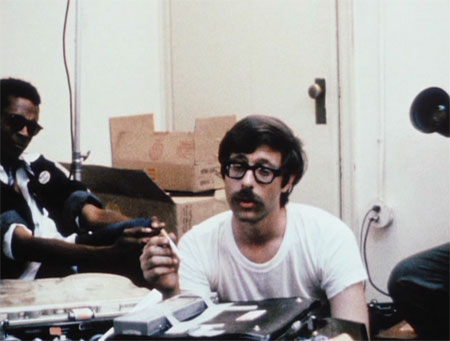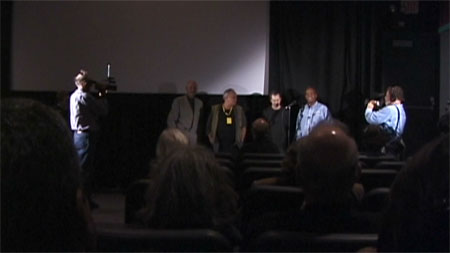A part of this viewing list: Criterion Collection Spine #360: William Greaves’s Symbiopsychotaxiplasm.

Symbiopsychotaxiplasm is most interesting to me because it is a experiment in which, for the most part, the people in the film know they are being experimented upon and then become participants in the experiment themselves. It is uncontrolled metafilmmaking that defies analogy by its sheer complexity. It is difficult to tell who is being authentic, who is acting, and just where the line between documentary and fiction stands. My favorite film professor probably loves this movie. Filmed in the seventies, it used egregious amounts of film, several simultaneously-filming cameras and a bunch of crappy actors constantly retaking an overblown, lurid and poorly written psychodrama.

Whether this is all deliberate or not is, initially, unknown. In fact, whether or not the whole film is scripted is or not is unknown. It might just be an excellent faux-documentary. Suspicions of this are constantly raised, especially when one of the crew members says something along these very lines, that the audience has no way of telling whether they are legitimately secreting themselves as an act of defiance, or if Greaves is just off screen directing them. The sincerity of Greaves on-screen persona is also called into question by the crew, it is said that he doesn’t act they way we see when the cameras are not rolling. One of the crewmen says that he hasn’t read the concept so many times, and is nonetheless so perspicacious that he must be lying. The crew scenes are the best parts of the film and it is certainly early reality-TV, and a bit like Project Greenlight, albeit unguided and decidedly independent. The film being filmed is supposed to be about sex, but in the crew discussions becomes more about what constitutes believable screenwriting.

So I guess it is no surprise that when someone with Hollywood clout like Steve Buscemi saw the thing and wondered where the promised Take Two was, that a new film got made. This is very very bad. Take One existed in a hermetic environment, no one knew more about the film, no one knew the truth. The resulting Take Two and a Half is utterly disappointing. Made with the help of Soderbergh, it is shot with DV cameras, has Steve Buscemi in it, and lacks all of the punch of the original and also takes away from the original’s mystery. There is a bit of tension at the end when a mimic acting coach shows up, but it was obviously staged, and while it is another example of metafilmmaking, at the same time it is like seeing the same card trick over again. Even though Buscemi meant well, Take Two and Half should have never been made. I recommend watching the first one and not the sequel, that way it will remain mindblowingly in need of analysis.
